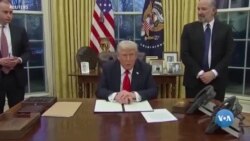ບັນດາທຸລະກິດຂະໜາດນ້ອຍຂອງສະຫະລັດ ກຳລັງລໍຖ້າທີ່ຈະຮູ້ສຶກ ເຖິງຜົນກະທົບຂອງດຳລັດປະທານາທິບໍດີ ດໍໂນລ ທຣຳ ໃນການກຳນົດພາສີ 25 ເປີເຊັນ ຕໍ່ການນຳເຂົ້າເຫຼັກ ແລະອາລູມີນຽມ. ມິແຊລ ຄວິນ໌ ມີລາຍງານ.
ມັນເປັນວັນບັນຈຸກະປ໋ອງຢູ່ທີ່ໂຮງງານຜະລິດເບຍ Temescal Brewing ໃນເມືອງໂອກແກລນ ລັດຄາລິຟໍເນຍ. ມື້ນີ້ພວກຄົນງານຈະຖອກເບຍສົດໃສ່ກະປ໋ອງອາລູມີນຽມ 6,000 ກະປ໋ອງ.
ເດືອນໜ້າພວກກະປ໋ອງເຫຼົ່ານີ້ ເປັນໄປໄດ້ສູງວ່າຈະມີລາຄາແພງຂຶ້ນ.
ປະທານາທິບໍດີ ດໍໂນລ ທຣຳ ເມື່ອບໍ່ດົນມານີ້ ໄດ້ລົງນາມໃນດຳລັດ ໂດຍຂຶ້ນຄ່າພາສີນຳເຂົ້າຕໍ່ ເຫຼັກ ແລະອາລູມີນຽມ. ອາລູມີນຽມທີ່ນຳເຂົ້າມາຈະຖືກວາງພາສີອາກອນ 25 ເປີເຊັນ ເຊິ່ງສູງຂຶ້ນຈາກອັດຕາ 10 ເປີເຊັນໃນລະ ຫວ່າງ ການດຳລົງຕຳແໜ່ງສະໄໝທຳອິດຂອງທ່ານ ທຣຳ. ສ່ວນເຫຼັກທີ່ນຳເຂົ້າມາຍັງຈະຖືກວາງພາສີອາກອນຕ່ຳສຸດ 25 ເປີເຊັນ ຂະນະທີ່ທ່ານ ທຣຳ ໄດ້ກ່າວວ່າທ່ານຈະບໍ່ຍົກເວັ້ນປະເທດໃດໆອີກຕໍ່ໄປຈາກຄ່າພາສີໃນປີ 2018 ຂອງ ທ່ານນັ້ນ.
ປະທານາທິບໍດີ ດໍໂນລ ທຣຳ ກ່າວວ່າ “ນີ້ເປັນການເລີ້ມຕົ້ນຂອງການເຮັດ ໃຫ້ອາເມຣິກາ ຮັ່ງມີອີກເທື່ອນຶ່ງ.”
ລັດຖະບານຂອງທ່ານທຣຳ ແນໃສ່ເພື່ອສົ່ງເສີມການຜະລິດຂອງ ສະຫະລັດ ໂດຍສະເພາະໃນອຸດສາຫະກຳເຫຼັກ ແລະອາລູມີນຽມ ເຊິ່ງຈະເປັນສິ່ງທີ່ດີຫຼາຍ ສຳລັບເສດຖະກິດທີ່ໄດ້ດີ້ນຮົນຕໍ່ສູ້ກັບການນຳເຂົ້າທີ່ຖືກກວ່າ. ປະມານນຶ່ງສ່ວນສີ່ຂອງເຫຼັກທີ່ນຳໃຊ້ໂດຍ ສະຫະລັດ ແມ່ນຖືກນຳເຂົ້າມາ, ໂດຍສ່ວນຫຼາຍມາຈາກການາດາ ແລະເມັກຊິໂກ. ສະຫະລັດ ຍັງນຳເຂົ້າອາລູມີນຽມປະມານເຄິ່ງນຶ່ງສ່ວນຫຼາຍຈາກ ການາດາ.
ແຕ່ອຸດສາຫະກຳອື່ນໆໄດ້ຄາດການໄວ້ແລ້ວວ່າ ເປັນໄປໄດ້ສູງທີ່ພວກເຂົາຈະຕ້ອງໄດ້ຈ່າຍໃນລາຄາທີ່ສູງກວ່າເກົ່າໃນຂະນະທີ່ການຜະລິດເຫຼັກ ແລະ ອາລູມີນຽມພາຍໃນປະເທດຈະມີຄວາມໄວຂຶ້ນ.
ທ່ານແລ້ນສ໌ ເຮສຕິງສ໌ ຢູ່ທີ່ສະມາຄົມຜູ້ຜະລິດ ແລະເທັກໂນໂລຈີຂອງລັດ ຄາລິຟໍເນຍ ກ່າວຜ່ານຊູມ ວ່າ “ພວກເຮົາສາມາດເຫັນການຟື້ນຕົວຂອງອຸດສາຫະກຳເຫຼັກ ແລະ ອາລູມີນຽມໃນລັດ ຄາລິຟໍເນຍ ແລະ ສະຫະລັດ, ເຊິ່ງຈະເປັນຜົນດີຕໍ່ເສດຖະກິດຂອງເຮົາຫຼາຍ ຜົນກະທົບດ້ານລົບນີ້ໄດ້ສົ່ງຜົນກະທົບຕໍ່ທຸກຄົນ.”
ສິ່ງທັງຫຼາຍເຫຼົ່ານັ້ນ ອາດຈະລວມທັງການເພີ້ມຄ່າໃຊ້ຈ່າຍຕ່າງໆທີ່ຖືກຕັດໄປທົ່ວອຸດສາຫະກຳທັງຫຼາຍ ທ່ານເຮສຕິງສ໌ ກ່າວ.
ທ່ານ ເຮສຕິງສ໌ ອະທິບາຍຕື່ມວ່າ “ເຫຼັກ ແລະອາລູມີນຽມແມ່ນນຳໃຊ້ໂດຍທົ່ວໄປ. ສິ່ງເຫຼົ່ານັ້ນແມ່ນມີຢູ່ທົ່ວທຸກແຫ່ງ. ສິ່ງເຫຼົ່ານັ້ນມີຄວາມຕ້ອງການຢູ່ທົ່ວທຸກແຫ່ງ. ເຊັ່ນການກໍ່ສ້າງ. ຕຶກໂຮງຈັກໂຮງງານທັງຫຼາຍ. ລົດຍົນກໍເປັນຕົວຢ່າງທີ່ດີອີກອັນນຶ່ງ. ພວກເຮົາຕ້ອງການມັນໃນການດຳລົງຊີວິດແຕ່ລະວັນ.”
ຢູ່ທີ່ບໍລິສັດເບຍ Temescal Brewing ນີ້ ຈຸດສຸມແມ່ນການນຳເອົາເບຍບັນຈຸເຂົ້າໃນກະປ໋ອງ ແລະສົ່ງອອກໄປ. ຕະຫຼອດສິບປີຜ່ານມາ, ເບຍສົດເຊິ່ງເຄີຍນຳໃຊ້ການນຳສົ່ງຕົ້ນຕໍໃນຂວດແກ້ວ, ກໍໄດ້ຫັນປ່ຽນມາເປັນກະປ໋ອງອາລູມີນຽມ, ຈຶ່ງເຮັດໃຫ້ໂຮງງານຜະລິດເບຍມີຄວາມສ່ຽງຕໍ່ການເກັບພາສີຕ່າງໆ.
ທ່ານລູກັສ ເມດີນາ ຜູ້ຜະລິດເບຍ ກ່າວວ່າ “ສຳລັບໂຮງງານນ້ອຍຫຼາຍແຫ່ງ, ມັນສາມາດເຮັດໃຫ້ເປີດ ຫຼື ປິດໄດ້ ເປັນຍ້ອນການກຳນົດພາສີອາກອນ ແລະ ທຸກສິ່ງທຸກຢ່າງນັ້ນ. ມັນບໍ່ແມ່ນສິ່ງທີ່ພວກເຮົາຕື່ນເຕັ້ນນຳເລີຍ.”
ໂຮງງານເບຍນ້ອຍແຫ້ງນີ້ ເປັນສ່ວນນຶ່ງຂອງລະບົບນິເວດໃນການຄ້າລະດັບໂລກ. ຍົກຕົວຢ່າງເຂົ້າໝັກທີ່ເປັນສ່ວນປະສົມເບຍ ມາຈາກປະເທດການາດາ. ຄວາມເປັນໄປໄດ້ຂອງສົງຄາມການຄ້າທີ່ອາດໃຫຍ່ຂຶ້ນນັ້ນ ເຮັດໃຫ້ເກີດຄວາມກັງວົນຕໍ່ຫົວໜ້າຝ່າຍບໍລິຫານຂອງໂຮງງານນີ້.
ທ່ານແບຣນດອນ ບົວໂຈລ ຜູ້ອຳນວຍການໃຫຍ່ ຫຼື CEO ຂອງບໍລິສັດ Temescal Brewing ກ່າວວ່າ “ສິ່ງທັງຫຼາຍເຫຼົ່ານີ້ ເຮັດໃຫ້ພວກເຮົາຢ້ານ ເພາະວ່າ ພວກເຮົາໄດ້ປະເຊີນກັບຄວາມຫຍຸ້ງຍາກສັບສົນຢູ່ແລ້ວ. ບັດນີ້ ຖ້າຕ່ອງໂສ້ການສະໜອງຂອງພວກເຮົາຖືກກະທົບກະເທືອນໃນທັນທີ ກໍເປັນການເຮັດໃຫ້ລາຄາແພງຂຶ້ນຫຼາຍ, ທີ່ພຽງແຕ່ເຮັດໃຫ້ກາຍເປັນໄພອັນຕະລາຍທີ່ໃຫຍ່ຂຶ້ນກວ່າເກົ່າ.”
ການຂຶ້ນພາສີຕໍ່ການນຳເຂົ້າເຫຼັກ ແລະອາລູມີນຽມຂອງ ສະຫະລັດ ມີກຳນົດຈະຖືກບັງຄັບໃຊ້ໃນວັນທີ 12 ມີນານີ້.
ອ່ານລາຍງານໃນພາສາອັງກິດ
U.S. small businesses are waiting to feel the effects of President Donald Trump’s executive order imposing a 25% tariff on imported steel and aluminum. Michelle Quinn reports.
It'a canning day at Temescal Brewing in Oakland, California. Today, workers will pour craft beer into 6,000 aluminum cans.
Next month, these cans will likely be more expensive.
President Donald Trump recently signed an executive order raising tariffs on steel and aluminum. Imported aluminum will face a 25% tariff, up from Trump’s 10% rate during his first term in office. Steel imports will also face a minimum 25% tariff as Trump said he would no longer exempt any countries from his 2018 duties.
((President Donald Trump))
“This is the beginning of making American rich again.”
The Trump administration aims to boost U.S. manufacturing, particularly the U.S. steel and aluminum industries, which have struggled against cheaper imports. About a quarter of the steel used in the U.S. is imported, much of it from Canada and Mexico. The U.S. also imports about half its aluminum, mostly from Canada.
But other industries are anticipating they will likely have to pay higher prices while domestic steel and aluminum production gets up to speed.
((Lance Hastings, California Manufacturers and Technology Association)) ((Zoom))
“We could see a renaissance, if you will, for California and the U.S. steel and aluminum industries, which would be a very good thing for our economy. The negative impacts are felt by everyone else.”
Those could include increased costs that cut across many industries, he said.
((Lance Hastings, California Manufacturers and Technology Association))((Zoom))
“Steel and aluminum are ubiquitous. They're everywhere. They are needed everywhere. Construction. Building factories. Cars is another good example. We need it in our everyday lives.”
Here at Temescal Brewing, the focus is on getting beer canned and out. Over the past decade, craft beer, which used to be primarily delivered in glass bottles, shifted to aluminum cans, making breweries vulnerable to tariffs.
((Lukas Medina, Temescal Brewing))
“For a lot of small places, it can be open or closed due to tariff pricing and everything. It's not something we're ever stoked on.”
This small brewery is part of a global trade ecosystem. Its malt comes from Canada, for example. The possibility of a bigger trade war worries its chief executive.
((Brandon Borgel, Temescal Brewing CEO))
“These things scare us because we are already up against some significant headwinds. Now if we throw suddenly our supply chain is going to get a lot more expensive, that just becomes an even bigger threat.”
The U.S. tariffs on imported steel and aluminum are scheduled to go into effect on March 12.






ຟໍຣັມສະແດງຄວາມຄິດເຫັນ